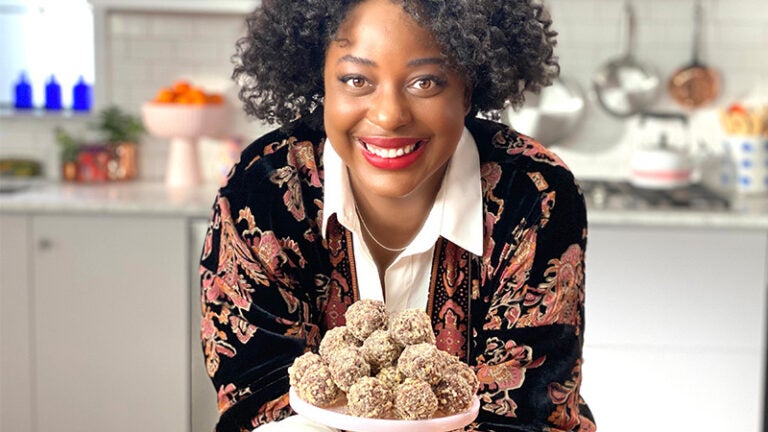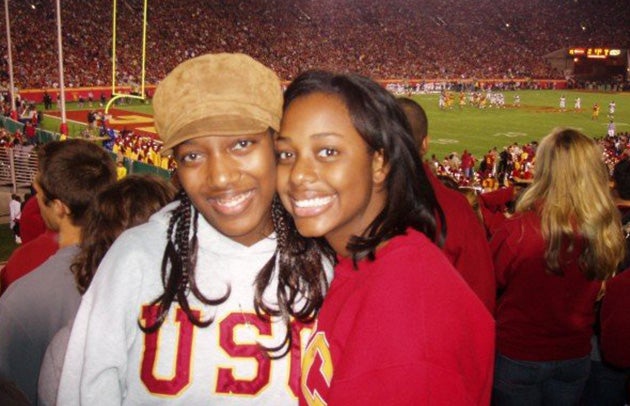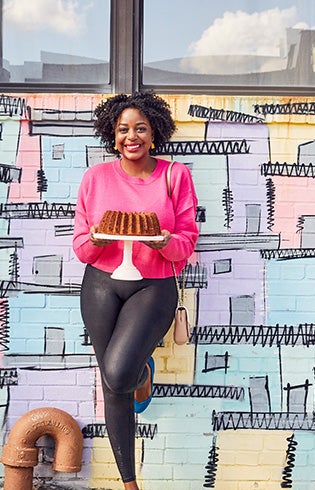
USC Dornsife alumna Vallery Lomas says, ‘Life is what you bake it’
When she was about 11, Vallery Lomas was sent to her grandmother’s house to learn a million-dollar family tradition.
It was a three-tiered, cream cheese-frosted, jelly-filled cake that was so rich, it’s been dubbed “Million Dollar Cake.” Her Grandma Willie Mae showed her how to neatly arrange the layers and smooth frosting over the sides.
Her mother had selected Lomas out of all her siblings to learn this important family recipe. “My mom must have seen something in me before I did,” says Lomas.
It took a while for Lomas’ baking gene to fully emerge, however. After graduating from the USC Dornsife College of Letters, Arts and Sciences in 2007 with a degree in psychology, she completed a law degree from the USC Gould School of Law and practiced law for eight years.
She began baking as stress relief, then started a food blog before eventually winning the fourth season of the Great American Baking Show, part of the same franchise that produces the popular Great British Baking Show. She was the first Black winner in the franchise’s history.
Her new cookbook, Life Is What You Bake It (Clarkson Potter, 2021), traces this path from lawyer to baker, and the ups and down along her career change — including the fact that her winning episode never aired.
“There are stories in the book about my grandmother, the evolution of recipes, the Hollywood handshake. Having that story-telling component was probably as important as the recipes for me,” says Lomas. “Pieces of me are in this book.”
South to Southwest

Both Lomas and her sister Lucy (left) are double Trojans. (Photo: Courtesy of Vallery Lomas.)
Lomas grew up in Baton Rouge, Louisiana. Few people she knew left the South for college, but her sister Lucy did, enrolling as a biomedical engineering student at the USC Viterbi School of Engineering.
During her junior year in high school, Lomas flew out to Los Angeles to visit for a week. She stayed in Lucy’s dorm at Somerville Place, a residential floor at the University Park Campus where Black students are encouraged to find community. Opened in 1995, the housing is named after John and Vada Somerville, two of Los Angeles’ first Black dentists and graduates of the Herman Ostrow School of Dentistry of USC.
Back home in Louisiana, Lomas didn’t have a particularly diverse friend group. Her weekend at USC, surrounded by a mix of Black and international students, was eye-opening. “I knew then and there that USC was where I wanted to go to school,” says Lomas. “I didn’t really apply to other colleges. I knew I was going to USC.”
Lomas enrolled first as a health and humanities major, thinking she might want to attend medical school. She also continued taking French, which she’d started studying in high school. A scholarship allowed her to spend a formative summer abroad in Dijon, France, where she realized her true passion did not lie in medical school but in exploring the world.
“While I was still in Dijon, I went online and dropped all of my pre-med classes. I changed my major to psychology with a French minor,” says Lomas.
Smile, you’re on camera
After graduating from USC Dornsife, Lomas enrolled at the USC Gould School of Law. Her sister, now a medical resident at the Keck School of Medicine of USC, shared an apartment with her.
It was a tough time for the Lomas sisters. Her sister had unexpectedly lost her fiancée. The 2008 recession had left the economy in a slump. Both were enrolled in intense career programs. Vallery wanted an outlet, so she turned to the rolling pin — a decision that benefited both women.
“I could bake while my sister talked with me in the kitchen or, when she’d come home late from being on call, I’d leave something for her in the cake dome,” recalls Lomas.
After finishing law school and moving to New York City in 2011, she took a job in privacy law. And she also spent nights and weekends photographing and writing about her bakes and recipes on a blog she dubbed “Foodie in New York.”.
Lomas also showcased her work on her @FoodieInNewYork Instagram, at the time a newer social media platform that most of her fellow food writers were dismissive of. It was a gamble that paid off. A casting director for The Great American Baking Show found her there and suggested she audition.
“I had a lot of reservations about going on the show. I was working so hard to build up a reputation. I could do terribly and then there goes everything I’ve been building towards,” says Lomas. In the end, she decided it was a risk she was willing to take. “I was betting on myself,” she says.
Lomas excelled in the competition, acing the finale with a recipe for cream puffs that included lemon curd and ginger.
It was a triumph she never fully got to celebrate. One of the show’s judges was accused of sexual harassment, and ABC pulled the final episodes from broadcast.
Global foodie

Baking first helped Lomas relieve stress during law school, then turned into a successful career. (Photo: Linda Xiao.)
It was a major disappointment, but it sparked an important career change.
“After the baking show got canceled, I was back at work and just burnt out. I knew I wanted to write a book, to talk about my experiences and how I felt. But I was going to work all day and I didn’t have the energy to write the proposal. So, I left my job,” says Lomas.
She asked a friend who’d recently published a book to put her in touch with some publishing contacts. Producing a book was no easy feat, even after many years of experience blogging and developing her recipes.
“Cookbook publishing is historically not that friendly for Black people,” says Lomas. “I remember I looked at all the big cookbook publishers on my bookshelf and there were very few Black authors.”
But she persevered, eventually securing the book deal.
For Lomas, quitting her job to write a book was another risky bet on herself that came with rewards. Life is What You Bake It was named one of the best cookbooks of 2021 by the likes of The Washington Post and the Boston Globe.
She also was named an arts envoy for the United States Embassy in the West African nation of Benin, where she recently spent two weeks. Her French skills honed at USC Dornsife came in handy: “I’m pretty sure I was selected because I spoke French,” says Lomas.
She conducted cooking demonstrations on Benin public television shows, and she also found herself on the other side of the gavel, judging a baking competition. It’s the sort of work abroad that she’d envisioned back when she was an undergraduate studying in Dijon.
Despite a somewhat circuitous path, it’s a fate that seems somewhat foretold. Before she left Dijon, her host family had gifted her a cookbook. “Another example of someone knowing something about me before I did,” she notes.